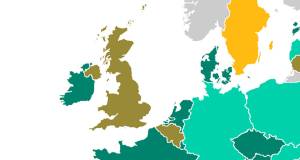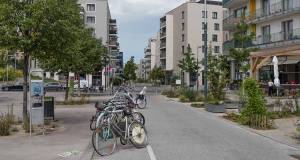- Policy
- Posted
Clear skies

Renewable Energy Grants. As the effects of global warning and climate change become increasingly evident each year, and the looming threat of huge EU fines for excessive CO2 emissions grows, Construct Ireland investigates what measures the Irish government is undertaking to actively encourage the homeowner to switch to non-polluting renewable energy sources.
Last January saw the UK Minister for Energy, Minister Brian Wilson, launch a new £10 million initiative known as “Clear Skies”, to encourage the domestic uptake of renewable energy. The scheme allows UK homeowners to receive government grant funding, from £500-£5000, to reduce their initial expenditure for installing clean renewable technologies such as solar powered water heaters, geothermal heat pumps and wind turbines into their homes. On launching the scheme Brian Wilson stressed that “renewable energy is all about thinking small as well as big”. The scheme additionally supports a number of other renewable technologies including micro-hydro, wood pellet stoves, and wood fuelled boiler systems. These renewable technologies offer a potent and viable solution towards countering and halting the increase of greenhouse gases.
The amount of grant money available for the homeowner is dependant on the technology that is installed. For example, for the installation of a solar panel water heating system, with a typical cost from £2000-£4500, a £500 grant is made available regardless of the system’s size. For a wind turbine (£2500-£5000) a £1000 grant is available, and for a ground source heat pump (£4000-£6000) a £1200 grant is available, to promote uptake. For British homeowners situated near a river valley, or in a mountainous region, there is funding available to encourage micro-hydro developments. Substantial incentives exist for a number of other renewable energy sources, including photovoltaic solar panels that convert light to electrical energy for the home. The grant is contingent on the installation of the technology being carried out by an accredited installer who adheres to a strict code of practice. This is to ensure that homeowners receive a high standard of workmanship and also that the system installed is appropriate
for their needs.
“We’re still in the early days with Clear Skies however the program has generated an enormous amount of interest in the UK”, reports Tuija Halonen, deputy manager of the scheme. “We are aiming to promote the uptake of these renewable technologies, to improve them and also to increase the standard of their installation”.
The situation for Irish homeowners
At present Ireland has no such domestic grant scheme in operation, although grant money is available for larger community based developments. This could be seen as regrettable in light of Ireland’s current failure to curb its CO2 emissions to within the limit agreed to under the Kyoto Protocol, of 13% above its 1990 level by 2008-2012. In a recent report by Dr. Peter Bacon, it was estimated that Ireland is facing EU fines of up to €4 billion should it fail to meet its obligations, fines that many believe will fall upon the Irish taxpayer. The recent revelation that Ireland is currently at 31% above its 1990 CO2 emissions levels is a move closer to this failure. With this unappealing prospect looming, it would seem logical to do everything possible to reduce emissions, if the government has any real intention of honouring its commitments under Kyoto. To this end, many European nations have devised grant schemes to help bridge the gap between the renewable sector and domestic users, and in so doing help both to encourage the domestic uptake of renewables, and to create improved market conditions for the renewable energy industry. Construct Ireland spoke to several operators in the renewable sector to find out how they felt about Ireland’s grant system.
“Its madness, we’re probably one of the only countries in Europe that don’t give a domestic grant to the individual”, says Eco Heat’s Colm Lawler. “The demand is phenomenal but at the moment its not being transferred into sales as a result of no grants and high tax”.
“Ireland is falling behind”, says SolaCert’s Micheál Lyons. “There is a change that can occur and all it needs is a little push. People are very interested in renewables, however their first question is often, “Is there a grant for this? Is there a VAT reduction on this? Is there cash back with this?” At the moment the answer is No.”
It would undoubtedly be beneficial for Ireland to capitalise on this unprecedented degree of interest by aiding the homeowner interested in converting to clean energy. By adopting renewables, the Irish homeowner is contributing to achieving Ireland’s Kyoto targets as well as helping to safeguard the future of the Irish economy in the face of imminent fines. The implementation of a dedicated domestic grant scheme that would entitle financial aid would undeniably convert this high consumer interest in renewables into a higher consumer sales rate in renewable technology.
“At the very least Ireland needs to follow the example of other European countries and reduce the VAT level on renewable energy products”, adds Micheál. In making this allowance now the government could ultimately save money from EU fines and also prevent damaging Ireland’s desirable green image that is of such importance to its tourist trade. In a recently released report from the EU, Ireland was found to be third worst in Europe in regard to its worsening delays in implementing EU law, after Italy and Portugal, an indication of Ireland’s falling reputation in Europe.
“A lot of work isn’t even required into the planning stage, we can simply follow the guidelines of other European countries. If they work for them they’ll work for us”, continues Colm Lawler, further questioning the lack of domestic grant support.
This email address is being protected from spambots. You need JavaScript enabled to view it.
“We could learn some useful lessons by taking pieces of the Clear Skies scheme and making them available to the Irish customer”, says Dunstar’s Paul Sikora. Furthermore many of the individuals that Construct Ireland approached also had strong criticisms of the existing community grant mechanisms. Common issues raised concerned the high degree of complexity involved in applying and the amount of time that the process takes. “Life is short, if someone would like some financial assistance to get renewable energies, it isn’t reasonable to ask them to wait for as much as a year for a grant”, stresses Sikora.
In addition, the Clear Skies scheme is also promoting the movement of Irish renewable installers away from Ireland, as there is now increasing demand for business in Northern Ireland and Wales. The knock on effect of this could be hugely detrimental for Ireland’s ability to continue developing an infrastructure for renewable energy.
Construct Ireland contacted Kevin O’Rourke of Sustainable Energy Ireland (SEI) to find out what measures he believed would be necessary to encourage the domestic uptake of renewables, and to question why no domestic grant scheme currently exists. Regrettably, his responses were not available at the time of press. It is worth stressing that grant funding from various sources may be available for more capital intensive developments, and could therefore be an option for community purchasing.
It is becoming increasingly apparent that a considerable challenge lies ahead if Ireland is going to fully honour its obligations under Kyoto. The uptake of existing renewable solutions would increase hugely with a degree of financial aid, given that the initial cost of switching to a renewable source can be a cause of considerable hesitation for the homeowner. There is a growing consensus that domestic grants need to be embraced in order to catalyse the implementation of renewable energy technology in Irish homes. The question therefore remains as to whether the Irish government will respond to the proactive initiatives of other EU member states, and show a real commitment to the role renewable energy can play in Ireland’s future
- renewable
- energy
- grants
- solar
- Heating
- heat pumps
- Geothermal
- wood pellet
- home heating
- Ireland
- Renewable Energy Grants
Related items
-
 Peaky blinder
Peaky blinder -
 History repeating
History repeating -
 King of the castle
King of the castle -
 Energy poverty and electric heating
Energy poverty and electric heating -
 Build Homes Better updates Isoquick certification to tackle brick support challenge
Build Homes Better updates Isoquick certification to tackle brick support challenge -
 Flat earth
Flat earth -
 Material matters - A palette for a vulnerable planet
Material matters - A palette for a vulnerable planet -
 Derelict to dream home
Derelict to dream home -
 Final opportunity for construction professionals to secure 80 per cent training subsidies
Final opportunity for construction professionals to secure 80 per cent training subsidies -
 Big picture - Points of access to resilient living
Big picture - Points of access to resilient living -
 Storm breaker
Storm breaker -
 Enniscorthy to host ‘make or break’ sustainable building summit
Enniscorthy to host ‘make or break’ sustainable building summit



